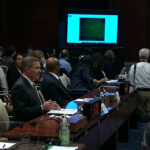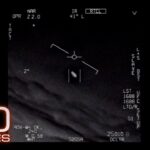Spy Satellites data Confirmed Discovery of the First Interstellar Meteor

U.S. Strategic Command officials confirmed Wednesday that the crash of small meteor that crashed of the Northeast Coast of Papua New Guinea in 2014 actually traveled from another solar system before splash down.
With the official name, CNEOS 2014-01-08, the meteor crashed on Jan. 8, 2014 with an energy equivalent to about 110 metric tons of TNT into the depths of the Pacific Ocean.
- World UFO Day!
 World UFO Day commemorates two separate dates. The first, on June 24th, recognizes the first widely reported UFO sighting on this same day in 1947 by aviator Kenneth Arnold. On July 2nd, the date commemorates the incident that took place in Roswell, New Mexico, in the same year. Before 1947, written record of humans sighting… Read more: World UFO Day!
World UFO Day commemorates two separate dates. The first, on June 24th, recognizes the first widely reported UFO sighting on this same day in 1947 by aviator Kenneth Arnold. On July 2nd, the date commemorates the incident that took place in Roswell, New Mexico, in the same year. Before 1947, written record of humans sighting… Read more: World UFO Day! - NASA to Discuss New Unidentified Aerial Phenomena Study Today
 NASA will host a media teleconference at 1 p.m. EDT today – Thursday, June 9 – to discuss a new study team the agency is commissioning to examine unidentified aerial phenomena (UAPs). The purpose of the study is to examine UAPs – observations of events in the sky that cannot be identified as aircraft or… Read more: <strong>NASA to Discuss New Unidentified Aerial Phenomena Study Today</strong>
NASA will host a media teleconference at 1 p.m. EDT today – Thursday, June 9 – to discuss a new study team the agency is commissioning to examine unidentified aerial phenomena (UAPs). The purpose of the study is to examine UAPs – observations of events in the sky that cannot be identified as aircraft or… Read more: <strong>NASA to Discuss New Unidentified Aerial Phenomena Study Today</strong> - Congressional Hearing on Government Investigation of UFOs
 On May 17, 2022, during the first congressional hearing on UFO sightings in more than 50 years, Pentagon officials told lawmakers extraterrestrial life is not the cause of what the government calls “Unidentified Aerial Phenomena.” For about ninety minutes those Pentagon officials talked to members of the House Intelligence Subcommittee on Counterterrorism and Counterintelligence.
On May 17, 2022, during the first congressional hearing on UFO sightings in more than 50 years, Pentagon officials told lawmakers extraterrestrial life is not the cause of what the government calls “Unidentified Aerial Phenomena.” For about ninety minutes those Pentagon officials talked to members of the House Intelligence Subcommittee on Counterterrorism and Counterintelligence. - LIVE: House Intelligence subcommittee holds open hearing on UFOs
 Reuters U.S. House Intelligence subcommittee hears testimony from two high-ranking military defense intelligence officials about UFOs in a session that will mark the first open congressional hearing on unidentified flying objects in more than half-century. #Reuters #Live #News #UFOs
Reuters U.S. House Intelligence subcommittee hears testimony from two high-ranking military defense intelligence officials about UFOs in a session that will mark the first open congressional hearing on unidentified flying objects in more than half-century. #Reuters #Live #News #UFOs - Spy Satellites data Confirmed Discovery of the First Interstellar Meteor
 U.S. Strategic Command officials confirmed Wednesday that the crash of small meteor that crashed of the Northeast Coast of Papua New Guinea in 2014 actually traveled from another solar system before splash down. With the official name, CNEOS 2014-01-08, the meteor crashed on Jan. 8, 2014 with an energy equivalent to about 110 metric tons… Read more: Spy Satellites data Confirmed Discovery of the First Interstellar Meteor
U.S. Strategic Command officials confirmed Wednesday that the crash of small meteor that crashed of the Northeast Coast of Papua New Guinea in 2014 actually traveled from another solar system before splash down. With the official name, CNEOS 2014-01-08, the meteor crashed on Jan. 8, 2014 with an energy equivalent to about 110 metric tons… Read more: Spy Satellites data Confirmed Discovery of the First Interstellar Meteor







